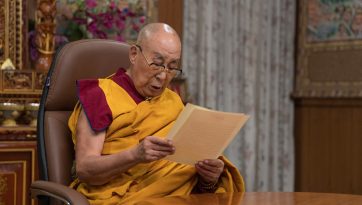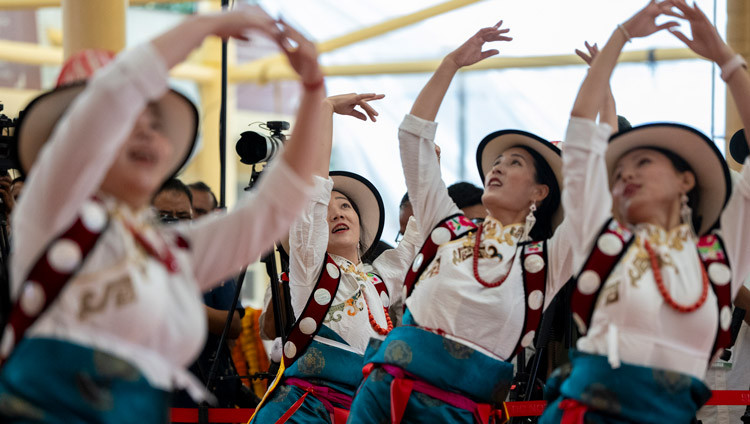India’s Heritage of Karuna & Ahimsa
October 26, 2020
Thekchen Chöling, Dharamsala, HP, India – Today, His Holiness the Dalai Lama was invited by the India International Centre (IIC) and the Foundation for Universal Responsibility of His Holiness the Dalai Lama (FURHHDL) to speak about India’s heritage of ‘karuna’ and ‘ahimsa’, and to answer questions from a number of old friends. As soon as he was seated, Rajiv Mehrotra, Secretary FURHHDL, greeted him: “Tashi Delek, Your Holiness, our gratitude to you for who you are, and for being with us today. Mr NN Vohra, President IIC, will welcome you”.
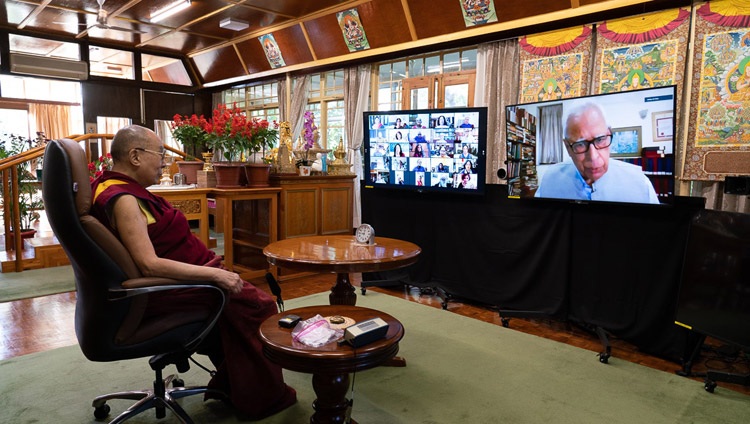
Mr Vohra recalled his long connection with His Holiness during his service with the Government of India, which began on the very day that Prime Minister Nehru announced that His Holiness had entered India after escaping from Tibet. He has had occasion to meet His Holiness numerous times over the years, most recently receiving him as a guest at the India International Centre. He welcomed him, saying, “Namaskar,”
His Holiness responded that he was very happy to have the opportunity to talk with long-standing friends by video link. “For 61 years India has been my home,” he told them. “As the Prime Minister mentioned at the UN, the Buddha was an Indian. All my thinking has its basis in the Buddha’s teachings. His advice to his followers, ‘O monks and scholars, as gold is tested by burning, cutting and rubbing, examine my words thoroughly and accept them only then — not just out of respect for me’, amounts to a scientific approach.
“Although we are Tibetan and our faces are different from yours, mentally we are Indian. Indeed, in the 7th century, although the then King of Tibet had close links to Tang dynasty China, he chose to model Tibetan writing on the Indian Devanagari script. In the following century, despite the presence of Chinese Buddhist teachers, the King elected to bring Buddhist learning to Tibet from Nalanda University. Consequently, he invited the great scholar Shantarakshita to visit him. Shantarakshita advised that, since Tibetans had their own written language, it would be of benefit to translate Indian Buddhist literature into it.
“The resultant collection consists of 100 volumes of the Buddha’s discourses and about 200 volumes of works by such masters as Nagarjuna, Aryadeva and Arya Asanga. These deal with logic, philosophy, psychology and Vinaya or monastic discipline. We would memorize many of these works. I myself began to learn several of these books by heart from the age of seven. Consequently, my mind and my fellow Tibetans’ minds are filled with Indian thought.
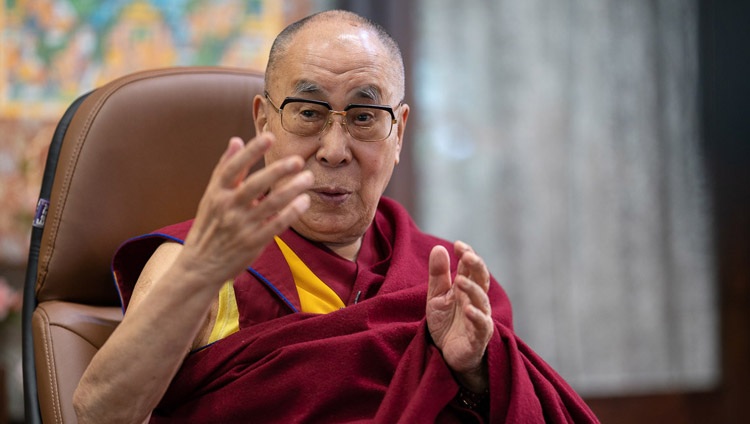
“I’m now nearly 86 years old and my life is guided by four commitments. The first is that as a human being I try to promote an understanding that humanity needs the Indian traditions of ‘karuna’ and ‘ahimsa’. As human beings we are all the same and we have to learn to live peaceably together. Conflict arises from thinking in terms of ‘us’ and ‘them’. And yet we are physically, mentally and emotionally the same. Whether we are from east or west, north or south, we depend on each other. The global economy is interdependent.
“As a Buddhist monk, I believe that harmony among our religious traditions is important. Look at India, all the world’s major religious traditions flourish here. Besides indigenous Indian traditions, Zoroastrianism, Judaism, Christianity and Islam have taken root here. India has set an example that religious harmony is possible. Despite different traditions maintaining different philosophical points of view, they all convey a message of love and compassion and stress the importance of forgiveness, tolerance and contentment.
“Since religious traditions involve human beings, they emphasise basic human values. Without our mother’s love at the start of our lives, we would not survive. We are social animals; we live in dependence on each other. Our natural concern for the members of our community is an expression of compassion. And because our religious traditions foster these qualities, I am dedicated to encouraging harmony among them.”
His Holiness explained that he is also a Tibetan, someone in whom the Tibetan people have placed their hopes. In 2011, he devolved his political responsibilities to an elected leadership. However, he remains concerned about the Tibetan environment. As global warming increases, there is a risk that if nothing is done to avert it, in coming decades the rivers and lakes that are sources of water for much of Asian will dry up.
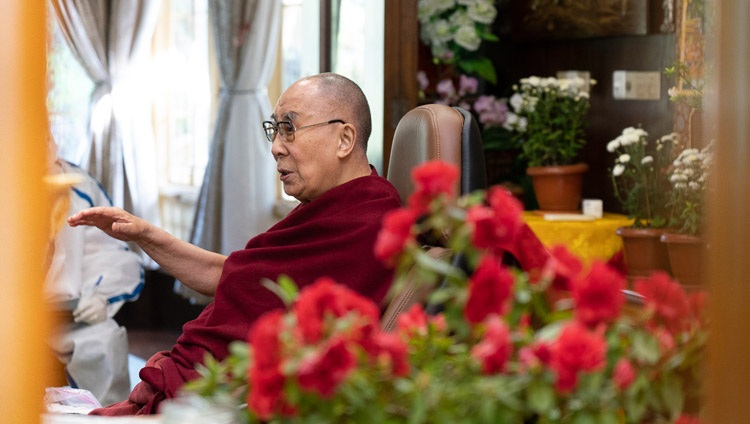
In addition, he is committed to keeping Tibetan culture alive. After the Buddha’s teachings reached Tibet, many Tibetans travelled to India to study at centres of learning such as the universities of Taxila, Nalanda, Vikramashila and Odantapuri. Consequently, Tibetan Buddhism adopted a rigorously logical approach to learning. His Holiness attributes to this his ability to engage in valid discussions with modern scientists, which have been mutually beneficial. He jokingly remarked that in the past Tibetans regarded Indians as their gurus and themselves as the ‘chelas’, but over time the roles seem to have been reversed. Therefore, he has a major commitment to preserving Tibetan culture and tradition.
His Holiness reiterated the debt of knowledge Tibetans owe to India. He points out that modern education has value, but its focus is materialistic. It needs to be balanced by reviving interest in ancient Indian knowledge of the workings of the mind and emotions. If this, as well as non-violence and compassion, concentration and analytical insight, could be combined with modern education, it would be of significant benefit. People could learn to employ emotional hygiene, that is to tackle their destructive emotions.
His Holiness believes that in the last century Mahatma Gandhi had a lasting impact on the world when he showed how non-violence could be effective. He remains convinced that if Indians today were to revive ancient Indian knowledge of the mind and emotions, they would have a similarly beneficial effect on the world. Therefore, he is committed to promoting a revival of interest in ancient Indian knowledge in India now.
Rajiv Mehrotra moderated a short question and answer session. First to ask a question was Shivshankar Menon – former National Security Adviser & Foreign Secretary of India, who first met His Holiness when he five years old. He wanted to know how to apply ‘ahimsa’ and ‘karuna’ to present-day problems.
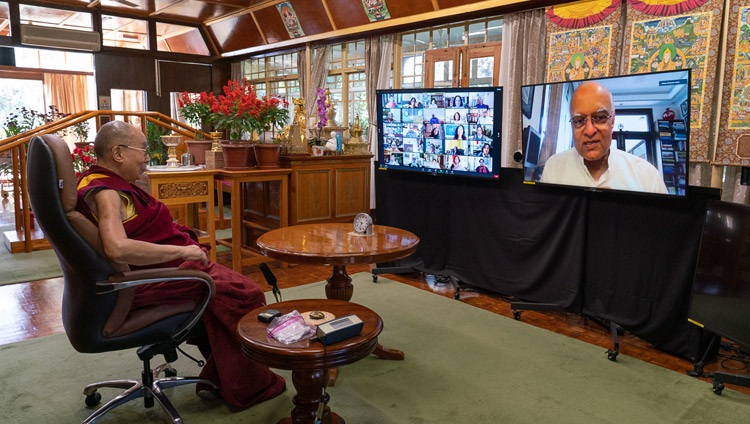
“Today, there’s too much emphasis on a sense of ‘us’ and ‘them’,” His Holiness told him. “However, there are many people across the world who are fed up with this narrow-minded thinking. There are signs that people have had enough of it, but are uncertain how to move forward. Under such conditions, India’s ancient traditions of non-violence and compassion are particularly important.
“I sometimes feel that after India gained independence, it would have been good if her leaders had paid more attention to education, especially with regard to the workings of the mind and emotions. That’s why it’s so important to revive interest in this understanding now. We need a new approach to improve existing ways of thinking and, on the basis of ‘ahimsa’ and ‘karuna’, India can make a significant contribution to this.”
Fali Nariman, a senior advocate to the Supreme Court of India, wanted to know about the place of prayer in human life. His Holiness replied that prayer is of great value on a personal level for those who have faith. But from a secular point of view, it’s necessary to think things through in an analytical way. To create a more peaceful world, he declared, it’s necessary to be at peace in your heart, to achieve which you need ‘ahimsa’ and ‘karuna’. Taking a secular approach requires that we use our human intelligence properly, reflecting that every sentient being, like us, wants to be happy, the basis of which is finding peace of mind. Combining our human intelligence with warm-heartedness is the most effective way of achieving this.
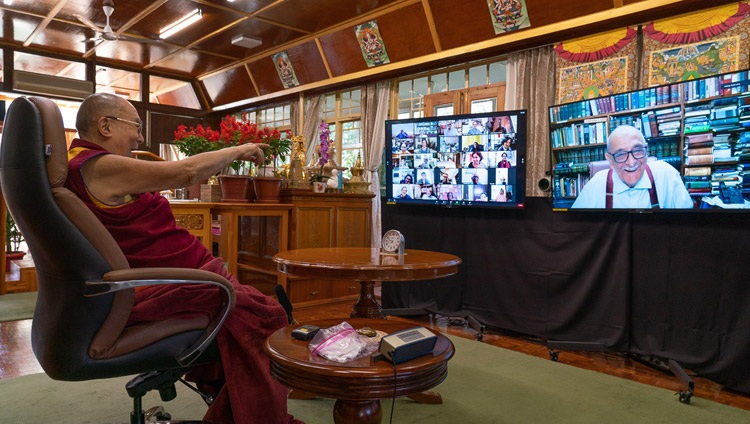
Gopalkrishna Gandhi, politician, former diplomat and grandson of the Mahatma, asked how to retain faith in compassion when it seems everywhere to be under attack.
“We must use our human intelligence,” His Holiness repeated. “Sometimes, out of concern for others’ well-being, you may have to take a tougher approach, if there is no other way. The main thing to consider is your motivation. If your motivation is harmful, the result will be damaging, but if you are well-motivated even taking a tough stance can be helpful.
“Quantum physics highlights the gap between appearance and reality. Sometimes something may appear to be negative, but in reality, it may not be so. It very much depends on our mental projection. Destructive emotions are based on having a distorted view of things. We think they exist objectively and exaggerate the qualities we are projecting onto them, whether good or bad.
“We forget, for example, that the person we think of as an enemy wants peace just as we do and so is deserving of compassion. Because we see them as an enemy, they appear to be hostile, but the reality is that they are another human being looking for peace and friendship like us.”
To a question from Mrs Syeda Hameed, a social and women’s rights’ activist, about the way forward for Muslims in India His Holiness replied that he had already observed that in India there is no conflict between Shias and Sunnis. He reported that he encouraged Ladakhi Muslims to convene a conference to discuss religious harmony. He noted that Muslims in India are familiar with the existence of other religious traditions and that they can live peaceably together.
Rajiv Mehrotra intervened to recall that following the 9/11 terrorist attacks in New York, His Holiness spoke up in support of Islam that he felt was being misrepresented as a source of violence and terrorism.
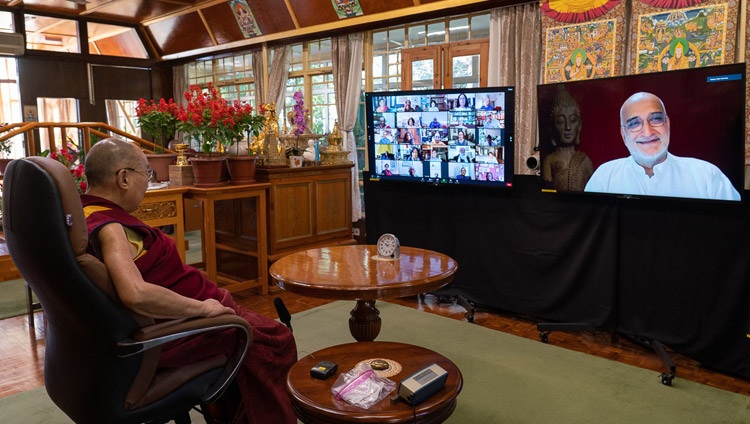
“So-called terrorists,” His Holiness replied, “are individuals and can be found among Buddhists, Jews, Christians, Hindus and Muslims. We can’t dismiss whole communities and their traditions because of the misguided mischief of a few individuals.
“I’ve been familiar with Muslims since my early childhood. When I reached Lhasa too there was a small Muslim community who had been offered land for a mosque by the Fifth Dalai Lama. Their representatives were always invited to Tibetan government functions.
“If you extend your hand in friendship, there’s no problem that can’t be solved. If you nurse suspicion, disputes ensue. The Muslim community in Lhasa were a peaceful community, who monks would turn to for information about India.”
Shyam Saran, former Foreign Secretary of India was interested to know how mental or emotional hygiene can be cultivated on a community, national or world level. His Holiness told him that the ancient traditions of ‘ahimsa’ and ‘karuna’ should be incorporated into the education system. He added that he was eager, when the pandemic has abated, to come to Delhi to discuss with educators how this could be done. The Nalanda Tradition included resources not only to tackle anger and fear, but also to cultivate compassion. The goal, he affirmed is to combine ancient Indian knowledge with modern education.
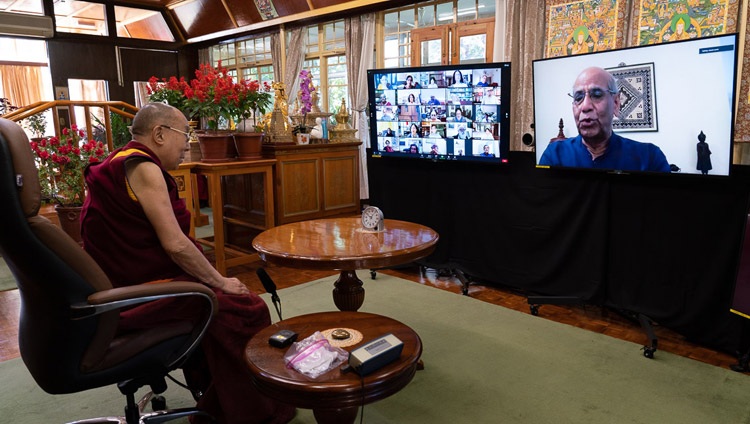
Social and political activist Ms Aruna Roy sought advice on dealing with these difficult times when hatred proliferates, right and wrong are reversed and taking a secular view is seen as a mistake.
“I have a strong feeling that if we use our intelligence, we can overcome the problems we face,” His Holiness told her. “The situation has changed, so we need to rethink our response. We have to examine how problems like the gap between rich and poor have come about, and how they can be addressed. We need to adopt a fresh approach, to turn away from narrow-minded thinking. We need to avoid classifying each other in terms of ‘us’ and ‘them’ and instead acknowledge the oneness of humanity.
“Differences of colour, faith and nationality may exist, but they are of secondary importance. Young children don’t bother themselves with such distinctions. They prefer to smile and play happily. We must remind ourselves that we all want to live a happy life.
“The world is changing. Global warming is a symptom of this. According to the new conditions in which we find ourselves, we have to adapt and discover new ways of thinking.”
Social worker, and son of Baba Amte, Prakash Baba Amte’s question about how to put a stop to sexual violence prompted His Holiness to recommend that education should highlight what has gone wrong in the past in order that we can learn from it and bring about change. Sometimes, he suggested, religious custom may colour the perspective through which differences of male and female are seen. Education is the key to overcoming such prejudices.
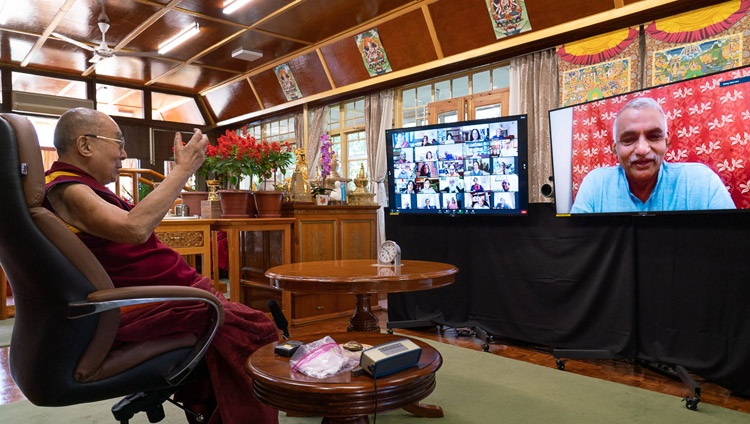
In thanking His Holiness for talking to the virtual gathering, Rajiv Mehrotra read a prayer that His Holiness live long:
To the assembly of most kind teachers, both present and past —
The miraculous dance of the body, speech, and mind of innumerable Buddhas
Manifesting in accord with aspirants’ spiritual capacities,
The wish-granting jewel, the source of all virtue and goodness —
To you, we offer our prayers with fervent devotion:
That Tenzin Gyatso, protector of the Land of Snows, live for a hundred eons.
Shower on him your blessings
So that his aspirations are fulfilled without hindrance,
And that we may all be his worthy students.
“Thank you, I’m looking forward to meeting you and many other old friends in Delhi when we can,” His Holiness responded. “We are all the same in being human, but conditions are changing so we too must change. I admire Western material development, but it lacks a sound understanding of the mind and emotions, so people in this country have to be more active in making ancient Indian knowledge better known. Thank you and goodbye.”
SOURCE: India’s Heritage of Karuna & Ahimsa



